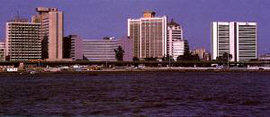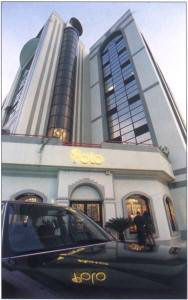
| 
|
 |
 NIGERIA
NIGERIA
A new business climate |

 Business - Economy - Lean and clean - Core issues - Home truth - Business - Economy - Lean and clean - Core issues - Home truth -
Oil business - Private sector - Banking 
 OPENING THE ECONOMY OPENING THE ECONOMY
America's Energy Secretary believes nigeria is on the mend: "I've witnessed a vibrant and energetic atmosphere in nigeria and it is clear to me that under President Obasanjo, nigeria is moving in the right direction in revitalizing the economy and bringing hope to the citizens of nigeria"
Bill Richardson who signed a memorandum of understanding, MOU, with nigeria on the energy sector urged President Obasanjo to make nigeria more investment friendly. He declared: "The Clinton administration feels that nigeria is one of the four countries in the world that require important American attention in investment. We have encouraged our petroleum sector to invest in nigeria. We think there are great opportunities here".
Richardson listed conditions nigeria should fulfill to attract greater American investment: respect for the sanctity of contracts, improved security situation, strict implementation of the privatization initiative, transparency in government business and agreement with the IMF /World Bank on stabilization program.
The Energy Secretary asked nigeria to work with the US to remove hurdles to investment: "I believe we have a specific plan for nigeria and that plan is to urge our American private sector to increase their investment. On the part of the nigerian government, we stress the importance of sanctity of contracts, and stability of terms".
nigeria's minister of power and steel, Chief Bola Ige said the signing of the MOU will lead to increased mutually beneficial relationship between the two countries. "You, Americans are the greatest in the American Hemisphere and nigeria, we are the greatest in Africa", he said.

During Richardson's visit Enron Energy Corporation signed power supply joint venture agreement with nigeria's commercial capital Lagos and a local conglomerate. The deal which breaks the monopoly of the country's sole electricity company is expected to attract over US$ 800 million in private foreign investment.
Obasanjo has embraced the IMF and the World Bank. The former is to help revamp macroeconomic policy making after a decade of stop-go reforms. Michelle Camdesus was in nigeria early in the year while his deputy, Allassane Quattara came calling five months later. By IMF's schedule, a staff-monitored program commences with the inception of the new government leading to a medium term economic program.
Camdessus says nigeria's vision 2010 blueprint is a good starting point.
The government is equally seeking the assistance of the World Bank in getting nigeria's stalled privatization program on a fast track. As Enron's inroad into nigeria's energy sector shows, the once-closed economy is being unbundled. While the multilateral institutions plod on with untangling the casings, hard-headed multinationals, with eye on the African market of the future, are taking choice positions. There are no easy pickings, however.
Dr. Jonathan Long, a Briton and managing director of First City Merchant Bank in Lagos says foreign investors shouldn't have any illusions. "If you are going to play in this market, it involves a very substantial commitment, not just in money but of management time and of will. And the companies which have made a success of this market — Citibank, Guinness, Unilever, Nestle and so on — are companies where the foreign shareholders took the market seriously and worked at it very, very hard".
Vast segments of the economy have not seen development beyond the foundation level. Given bilateral governmental guarantees, foreign direct investment will essentially have to build, own and operate swathes of an economy long stuck at the primary stages of production. |

That was what mostly European multinationals had started doing in nigeria before 1970. Since then military rule has distilled Dutch Disease from oil wealth as wrong-headed policies wasted the economy. Experiencing three decades of lost opportunities has taught nigerian governments the worth of private sector investment, both local and foreign, as engine of growth and development. None feels the cost of this lesson more than Obasanjo who had presided over a much more prosperous nigeria.
Fundamental policy somersaults define nigeria's past and stamp ignominy on military mis-rule. It was only in the late 90s that nigerian governments realized the damage that indigenisation programs of the mid 70s, championed then by Obasanjo, have inflicted on this economy.
Yet indigenisation was one symptom of the malaise that instant oil wealth inflicted on public policy. Hands in glove, the military and the bureaucracy with money to burn proceeded to effect superficial structural change on the economy.
An ill-equipped and weak state was saddled with the onerous task of owning and managing "the commanding heights" of the economy. In the process, private investments in critical sectors were stifled. nigeria's problem, one military head of state said then, was not money but how to spend it.
Three decades of spending a windfall bred massive corruption, import dependency and abysmal domestic productivity. Dr. Long here gives a birds' eye view of nigeria's fall from grace to grass: "I don't quite know where to start. Well, thirty years of neglect, thirty years of policies that by and large, have been unfavorable to economic development, unfavorable indeed to the development of the country as a whole. This was a comparatively rich country thirty years ago. Now it is the tenth or so poorest in the world. And that is a result of systematically bad government.
And I think that until you start having some reasonably good government, then you are not going to make very much economic progress. So I will say the biggest threat to economic progress here traditionally has been government". Chinua Achebe, nigeria's foremost novelist couldn't agree more. Insisting nigerians must recognize where the rain began to "beat" us, he says the trouble with nigeria is "simply and squarely the failure of leadership".
Just as Achebe has just returned to nigeria after nine years of exile, so Dr. Long etches the new optimism on to a bleak canvass: "Hopefully with the new President, that is going to change. And at long last we will have a government that actually attaches some importance to economic and social development". |
© World INvestment NEws, 1999.
This is the electronic edition of the special country report on nigeria published in FORBES Magazine,
October 18 th issue.
Developed by AgenciaE.Tv |
|
|
|
| |
| | | |
|

